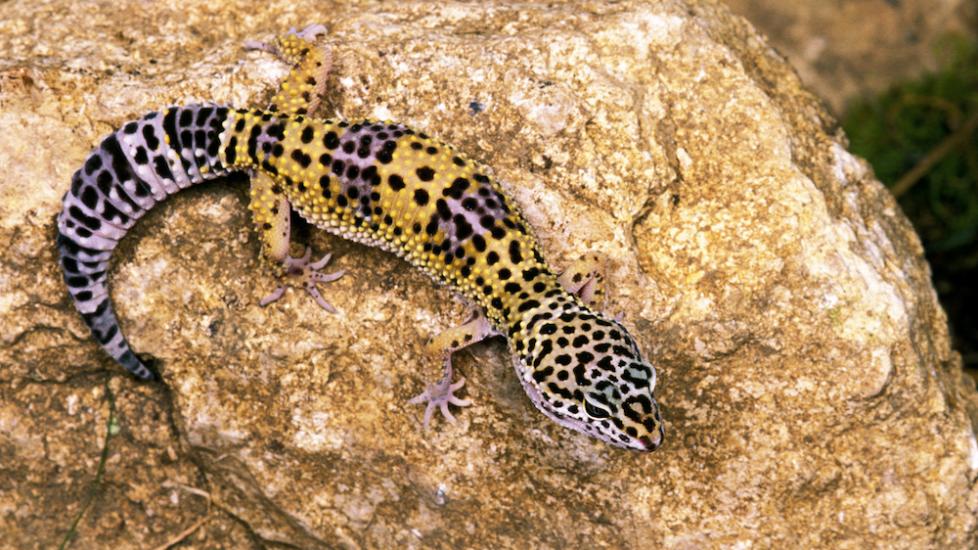How Long Do Leopard Geckos Live?
Leopard geckos get their name from the leopard spots on their backs, appearing once they reach adulthood. Although they are fairly small creatures–an average of 6-9 inches long, don’t let that fool you. Geckos are a big-time commitment and can live into their late 20s or early 30s, and some even 40!
Lifespan of Leopard Geckos
Leopard geckos can live 10-20 years in captivity with good healthcare, proper environment, and a healthy diet.
In the wild, however, leopard geckos typically only live only 6-8 years. Leopard geckos are originally from the grassland and desert regions of Afghanistan, India, and Pakistan. In these regions, they can suffer parasites, harsh weather changes like droughts, disease, and being preyed upon by other animals. They are preyed on by birds, scorpions, other lizards, snakes, and jackals in their natural environment.
Leopard Gecko Life Stages
-
Hatchlings: Age: 0-2 months | Length: 1.5-2 inches long | Weight: 2-5 grams
-
Juveniles: Age: 2-7 months | Length: 5 inches | Weight: 15-25 grams
-
Sub-adult: Age: 7-12 months | Length: 6-7 inches | Weight: 30-40 grams
-
Adult: Age: 12+ months | Length: 7+ inches | Weight: 50+ grams
Leopard geckos typically reach sexual maturity between 9-18 months old. This is also when their growth rate will slow down–stopping growth at around 1.5 years of age.
There are over 100 different morph types of leopard geckos, so it is important to find a reputable breeder. In addition, some morphs may require extra veterinary care, so work with your veterinarian to determine the specific needs of your leopard gecko.
What Makes Some Leopard Geckos Live Longer Than Others?
When selecting your leopard gecko, it is important to use a reputable breeder who understands genetics and breeds to ensure healthy leopard geckos, not just fun morphs. Certain morphs can be more prone to health issues, so it is essential to consult with your veterinarian and perform thorough research. For example, leopard geckos with the color pattern Enigma can have neurological symptoms like seizures. The Enigma pattern is an almost white tail, and their spots tend to be blotches or speckles instead of bands.
After selecting your leopard gecko, it’s critical to provide the proper nutrition so they can thrive. Leopard geckos consume live insects, including mealworms, super worms, wax worms, crickets, roaches, and other insects. They should be dusted with calcium and vitamin supplements and gut-loaded before feeding. It is important only to provide 1-2 insects at a time and to remove any prey items not consumed within 10-15 minutes so the insects do not chew on your pet.
The life expectancy of leopard geckos is also influenced by certain health conditions which can be mitigated by proper health maintenance and care. Leopard geckos commonly suffer from:
-
Metabolic bone disease or secondary nutritional hyperparathyroidism
-
Respiratory disease
-
Retained shed or failure to shed normally
-
Vitamin A deficiency
-
Eye disease
-
Sand impactions (ingesting sand and causing medical trauma)
-
Infections
-
Diarrhea
-
Egg Binding
How to Improve Your Gecko's Lifespan
There are many ways to improve your leopard gecko’s health and wellbeing—both of which can lead to a much longer life! Always consult with your veterinarian, but some general recommendations include:
-
Regular veterinary exams at least every year.
-
Regular bloodwork and yearly fecal parasite testing.
-
Ensure proper terrarium lighting, including appropriate temperature gradients (85-90 degrees F in the basking area and 75-80 degrees F in the cooler area), humidity, and accessible UVB lighting for 10-12 hours per day.
-
Check all parameters with a hygrometer, thermometer, and optionally a UV index meter.
-
Never use floor, heat mats, or heat rocks that can cause thermal burns.
-
Follow proper feeding schedules based on life stages—overfeeding can lead to obesity and other health issues.
-
Feed 1-2 healthy live insects at a time—dusted with calcium and multivitamins and gut loaded and provide fresh water.
-
Remove any uneaten insects within 10-15 minutes to prevent them from chewing on your pet.
-
Examine your pet frequently for abnormalities and watch for signs of illness.
-
Keep your adult leopard gecko in a 20-gallon tank at least.
-
Change UV bulbs every 6 months, even if they are still functioning with visible light.
-
Provide hiding/shed boxes with sphagnum moss or vermiculite to provide proper humidity for shedding. Inspect moss daily to make sure it is not drying out and is not moldy.
-
Clean/disinfect water and food bowls daily and spot clean removing any uneaten food and droppings
-
Thoroughly clean the habitat once a week, scrubbing with reptile cleaner or 3% bleach solution and rinsing thoroughly. Once dry, add in clean substrate.
-
Never grab geckos by their tail. They can release their tail and while it may regrow, it will never be the same as their original tail.
If you notice any of the following signs of illness, please schedule an appointment for your pet right away:
-
Weight loss
-
Decreased appetite
-
Lesions or swelling of skin
-
Lethargy
-
Labored breathing
-
Retained shed
-
Weak limbs
-
Diarrhea or blood in stools, or lack of poop
-
Discharge from eyes mouth or nose
References
-
Kubiak M. Handbook of Exotic Pet Medicine. John Wiley & Sons, Incorporated; 2020.
-
Rich DVM G. VCA Animal Hospital . Leopard Geckos: Care and Feeding
-
Tremper R. Leopard Gecko Care Sheet. Reptiles Magazine. 2012.
-
Pollock DVM DABVP C. Basic Information Sheet: Leopard Gecko. LafeberVet. 2014.
-
How To Care For a Leopard Gecko. RSPCA.
Featured Image: iStock.com/slowmotiongli
